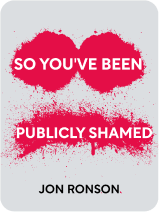

This article is an excerpt from the Shortform book guide to "So You've Been Publicly Shamed" by Jon Ronson. Shortform has the world's best summaries and analyses of books you should be reading.
Like this article? Sign up for a free trial here .
Do you struggle with feelings of shame? What are some strategies for dealing with shame and public humiliation?
Shame is a very distressing emotion caused by consciousness of despicable or embarrassing behavior. According to Jon Ronson, the author of So You’ve Been Publicly Shamed, there are six strategies for dealing with shame, although none of them restore the victim’s life to what it was like before the shaming, and many of the solutions are fragile.
Here are six strategies for dealing with shame and public humiliation.
Jon Ronson on Dealing With Shame
So you’ve been publicly shamed—what next? Ronson discovered that there are six approaches to dealing with shame and public humiliation.
Approach #1: Withdraw and Wait
Withdrawing includes shutting down social media accounts, refusing to give interviews, avoiding public places, and lying low until things blow over. This is a popular approach, though it doesn’t work particularly well—sometimes the shaming reincarnates when the shamee tries to return, and the shamee has to endure feelings of isolation.
Jonah Lehrer
For example, bestselling author Jonah Lehrer chose to withdraw when the news broke that he’d made up some of the Bob Dylan quotes that appeared in his most recent book, Imagine. He resigned from his job, refused interviews, and stayed home. The strategy didn’t work very well for him—after seven months, Lehrer tried to publicly apologize, but Twitter piled on again. When he tried to publish a new book, people mocked him.
Approach #2: Write a New Narrative
Before a public shaming, the victim has a life story. During the shaming, the public reduces the victim’s identity to revolve entirely around their transgression. Instead of holding on to the original narrative, approach #2 is to create a private third life narrative that explains the reasoning behind the transgression to reduce personal feelings of shame.
Mike Daisey
For example, like Jonah Lehrer, monologue writer and performer Mike Daisey committed literary fraud: He invented details in a non-fiction monologue about horrible working conditions at Apple factories that he performed on the podcast This American Life, among other venues. However, instead of withdrawing, he chose to create a new narrative.
Daisey told Ronson that he’d known in advance that if he went on the podcast someone would uncover his lies, but he decided to do it anyway because sacrificing his career was worth getting the story out. He cast himself as a hero to deal with his feelings of shame. He also defended himself online and responded to his shamers.
Approach #3: Become Emotionally Invulnerable to Shame
Becoming emotionally invulnerable to shame involves refusing to let shame affect you. To learn more about this approach, Ronson spoke to porn stars, who have to learn to manage shame because their industry is associated with it. Ronson interviewed Princess Donna Dolore, who said that if she publicly shared the things that embarrassed her, they were no longer embarrassing. One of her models, Jody Taylor, feels the same—she thinks that fiction, by nature, can’t be frightening or humiliating, so instead, the porn scenarios she performs are “awesome.”
Dolore’s goal is to make people feel less ashamed of what they want, and her work to demystify strange sex is probably part of the reason that fewer men are shamed for sex scandals these days.
Max Mosley
For example, Max Mosley chose to be invulnerable to shame when the news broke that he’d been involved in “sick” Nazi-themed orgies. He interviewed with BBC Radio 4 and agreed his sex life was strange, but he said people shouldn’t think badly of him for it. Mosley brought his actual personality closer to his public persona, unlike Lehrer, who was almost two entirely different people and was shamed for being two-faced.
Mosley also sued News of the World, the paper that had broken the story, because they’d written that the orgy was Nazi-themed, which, in reality, it wasn’t. It was only German-themed. Mosley won the case and as a result, most people see him as someone who was wronged.
Mosley’s decision to refuse to be ashamed certainly played a part in his outcome, but he probably also escaped shame because he was also a man in a consensual sex scandal.
Approach #4: Attend a Radical Honesty Workshop
Psychotherapist Brad Blanton believes shame thrives in secret—if you’re constantly worrying about what other people think or you’re worried about being exposed, you feel shame. Therefore, one way to deal with shame is to be honest about what it is you are ashamed of. For example, if you want to sleep with your wife’s sister, you should tell both your wife and her sister this. You can learn how to break news like this, or spill any of your secrets, by attending a Radical Honesty workshop.
To Ronson, the Radical Honesty method seemed to be mainly people yelling at each other, and sometimes this went quite badly. For example, after the workshop Ronson attended, one man tried to be honest with his wife and she tried to physically push him away. He responded by saying that he was going to get an ax and defend himself by killing her. Unsurprisingly, she called the police.
Approach #5: Apply for the Right to Be Forgotten
In 2006, the European Court of Justice ruled that if an online text about someone was “inadequate, irrelevant…or excessive,” people could request that Google deindex the article or blog from its European sites. This means that, in theory, you could ask Google to remove shameful information about you from its search indexes.
While this ruling did result in a lot of material being deindexed—within three months, 70,000 people made requests—it also brought some of the things that people wanted buried back into the spotlight. As Google met requests, it sent automatic notices to media outlets letting them know their articles had been deindexed, which created resistance to the ruling. People started bringing up old stories again so they couldn’t be forgotten.
Approach #6: Hire a Reputation Management Company
Reputation management companies aim to hide shameful or damaging information about people by creating new online content that knocks undesirable content onto the second or third page of online search results. According to Google, 53% of people don’t look past the first two search results and almost 90% of people don’t ever click past the first page.
Lindsay Stone
For example, after a photo of Lindsay Stone screaming beside a cemetery sign that read “Silence and Respect” went viral, she connected with a reputation management company called Reputation.com. The photo was Stone’s entire internet presence, and also the entire presence of anyone else with the same name. She couldn’t get a job or date because anyone who googled her would instantly find the photo and conclude that she was a bad person.
Reputation.com knocked the photo lower in the search results by making Stone new social media accounts (Twitter, LinkedIn, and Tumblr automatically show up high in the results because Google’s algorithm thinks these sites are popular). They wrote blog posts about travel, cats, top 40 music, and Stone’s other interests in her name.
It took four months of reputation management for the photo to start fading. When Stone googled herself, the photo showed up three or four times, but there were also lots of photos of Stone doing regular things, and photos of other Lindsey Stones. The reputation management process is ongoing, though, and Reputation.com calls Stone every week so she can approve Reputation.com’s latest content.

———End of Preview———
Like what you just read? Read the rest of the world's best book summary and analysis of Jon Ronson's "So You've Been Publicly Shamed" at Shortform .
Here's what you'll find in our full So You've Been Publicly Shamed summary :
- How public shaming can ruin people's lives
- Why public shaming isn't just a way to get corporations to do the "right thing"
- 6 strategies you can use if you're a victim of public shaming






